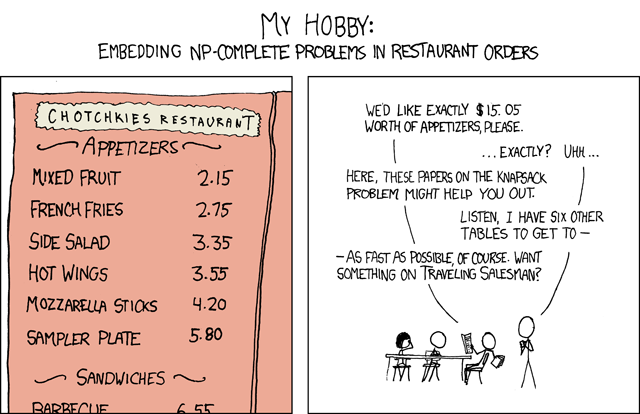language agnostic - Solving the NP-complete problem in XKCD -
the problem/comic in question: http://xkcd.com/287/

i'm not sure best way it, here's i've come far. i'm using cfml, should readable anyone.
<cffunction name="testcombo" returntype="boolean"> <cfargument name="currentcombo" type="string" required="true" /> <cfargument name="currenttotal" type="numeric" required="true" /> <cfargument name="apps" type="array" required="true" /> <cfset var = 0 /> <cfset var found = false /> <cfloop from="1" to="#arraylen(arguments.apps)#" index="a"> <cfset arguments.currentcombo = listappend(arguments.currentcombo, arguments.apps[a].name) /> <cfset arguments.currenttotal = arguments.currenttotal + arguments.apps[a].cost /> <cfif arguments.currenttotal eq 15.05> <!--- print current combo ---> <cfoutput><strong>#arguments.currentcombo# = 15.05</strong></cfoutput><br /> <cfreturn true /> <cfelseif arguments.currenttotal gt 15.05> <cfoutput>#arguments.currentcombo# > 15.05 (aborting)</cfoutput><br /> <cfreturn false /> <cfelse> <!--- less 15.05 ---> <cfoutput>#arguments.currentcombo# < 15.05 (traversing)</cfoutput><br /> <cfset found = testcombo(arguments.currentcombo, arguments.currenttotal, arguments.apps) /> </cfif> </cfloop> </cffunction> <cfset mf = {name="mixed fruit", cost=2.15} /> <cfset ff = {name="french fries", cost=2.75} /> <cfset ss = {name="side salad", cost=3.35} /> <cfset hw = {name="hot wings", cost=3.55} /> <cfset ms = {name="moz sticks", cost=4.20} /> <cfset sp = {name="sampler plate", cost=5.80} /> <cfset apps = [ mf, ff, ss, hw, ms, sp ] /> <cfloop from="1" to="6" index="b"> <cfoutput>#testcombo(apps[b].name, apps[b].cost, apps)#</cfoutput> </cfloop> the above code tells me combination adds $15.05 7 orders of mixed fruit, , takes 232 executions of testcombo function complete.
is there better algorithm come correct solution? did come correct solution?
the point np-complete problem not it's tricky on small data set, amount of work solve grows @ rate greater polynomial, i.e. there no o(n^x) algorithm.
if time complexity o(n!), in (i believe) 2 problems mentioned above, in np.
Comments
Post a Comment